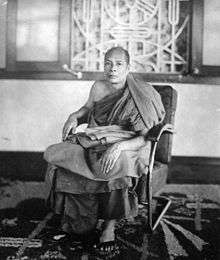U Vimala
| Mogok Sayadaw U Vimala | |
|---|---|
 | |
| Religion | Buddhism |
| School | Theravada |
| Dharma names |
Vimala ဝိမလ |
| Personal | |
| Nationality | Myanmar |
| Born |
27 December 1899 Uyindaw Village, Mandalay Province, Burma |
| Died |
17 October 1962 (aged 62) Amarapura, Mandalay Division, Burma |
| Senior posting | |
| Based in | Mogok Monastery, Amarapura, Burma |
| Title | Agga Maha Pandita |
U Vimala (Burmese: မိုးကုတ်ဆရာတော် ဦးဝိမလ, commonly known as the Mogok Sayadaw; 27 December 1899 - 17 October 1962) was a renowned bhikkhu and vipassanā meditation master of Theravada Buddhism.[1]
Early life

He was born Maung Hla Baw to Daw Shwe Ake and U Aung Tun in a small village close to Amarapura in Mandalay Province, Burma on 27 December 1899.[2] Hla Baw began his education at 4, and enrolled as a samanera or novitiate at age 9 under U Jagara.[2] He later left for Mingala Makuna Monastery at Amarapura to continue his religious studies.[2]
Monkhood
In 1920,[2] he was ordained as a bhikkhu (monk) in the tradition of Burmese Buddhism with the dharma name Vimala (ဝိမလ) which means "stainless, Undefiled." As his monkhood was sponsored by the residents of Mogok, a town well known for rubies and gems, Vimala became known as "Mogok". In 1924, Vimala became the chief abbot of Pikara Monastery. He began to give sermons focusing on abhidhamma and teaching vipassana meditation.[2]
Legacy
U Vimala established the Mogok tradition of vipassana meditation, which is independent of the meditation traditions established by his Burmese predecessors, Ledi Sayadaw and Mahasi Sayadaw.[3] U Vimala stressed dependent origination and cittanupassana as part of meditation practice.[3] There are currently over 300 meditation centers in Burma that teach his form of meditation.[3]
See also
References
- ↑ Aung Chi (2000). The Mogok Sayadaw: A Translation. Yangon.
- 1 2 3 4 5 Sway Tin (15 November 1999). "The Mogok Sayadaw". Nibbana.com. Archived from the original on September 27, 2012. Retrieved 23 June 2015.
- 1 2 3 Crosby, Kate (2013). Theravada Buddhism: Continuity, Diversity, and Identity. John Wiley & Sons. ISBN 9781118323298.
Further reading
- Seeking the Heart of Wisdom: The Path of Insight Meditation. Joseph Goldstein & Jack Kornfield (2001< Reissue) Shambhala. ISBN 1-57062-805-X
- Beyond the Breath: Extraordinary Mindfulness Through Whole-Body Vipassana. (2002) Marshall Glickman. Tuttle Publishing. ISBN 1-58290-043-4.
- Journey to the Center: A Meditation Workbook. Matthew Flickstein and Bhante Henepola Gunaratana. (1998) Wisdom Publications. ISBN 0-86171-141-6.
- In this Very Life Sayadaw U Pandita, In this Very Life
- The Anapanasati Sutta: A practical guide to mindfulness of breathing and tranquil wisdom meditation. Sayadaw Gyi Vimalaramsi(2006) (PDF)